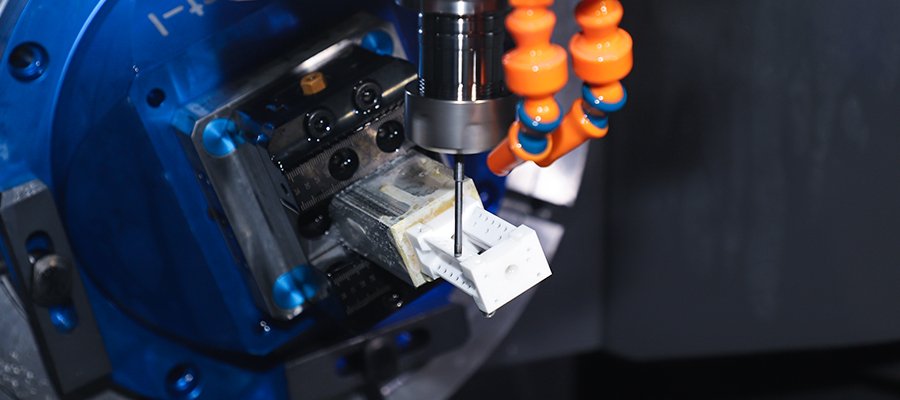Definition
Machinable glass ceramics is a special polycrystalline material. Unlike the familiar ceramics that are sintered by powder, it is formed by melting and quenching to form glass. Its machinability comes from the fact that the crystals in the microstructure allow crack deflection and will not cause failure due to local fractures, so it can be processed using traditional metal processing tools. MGC exists as a unique type of engineering material, combining the excellent properties of glass and ceramics, which is not possible with traditional ceramic materials.

Ingredient
| Material | Machinable glass ceramics |
| Chemical composition | 46% (SiO₂) ;17% (MgO);16% (Al₂O₃);10% (K₂O);7% (B₂O₃);4% (F) |
| color | White |
| Maximum Operating Temp. | ~1000°C |
| Processing accuracy | 0.001mm |
Key Properties
MGC can perform ultra-high precision machining of complex shapes, such as (ion trap supports, quadrupole supports, etc.), and has the advantages of zero porosity, zero outgassing, and low thermal conductivity.
✅ Complex shapes can be achieved without cracks
✅ Ultra-high vacuum compatible
✅ Zero porosity, zero risk of exhaust
✅ Maximum operating temperature up to 1000°C
✅ 0.0005-inch machining tolerance
✅ High electrical insulation
Application
From aerospace, semiconductors to medical, many fields have begun to use machinable glass ceramics materials as key components, such as:
✅ Electrically insulated vacuum feedthrough
✅ Plasma resistant parts
✅ Aircraft insulation gasket
✅ Medical biocompatible components
✅ Optical fixture
✅ Vacuum structural support
Custom Machinable Glass Ceramics
We can provide precision machining services for machinable glass ceramics. With our advanced 5-axis CNC machines and rich experience, we can achieve:
✅ Tolerances as tight as ±0.001mm
✅ Flatness down to 0.001mm
✅ Surface roughness as low as Ra 0.01μm (structural), Ra 0.002μm (optical)
✅ Micro-hole diameters as small as 0.1mm with 0.01mm accuracy
We support small batches, prototyping, and full production. Whether you’re submitting a CAD file or a concept sketch, our team will assist you from material selection to final delivery.
📩 Let’s bring your project to life – contact us for a custom quote.
FAQ
How to Machinable Glass Ceramics
Although Macor has the ability to process with standard metal tools, there are still some problems compared with metal (please check our latest machining guide for 2025). Ultra-precision machining can be achieved by using alloy milling cutters and correct machining parameters. For example, micro holes can be processed to 0.05mm, and internal threads can reach M1.4, but M1.4 needs to consider its practicality (it is recommended to be larger than M2). In addition, when processing threads, attention should be paid to edge collapse, which is recommended to be solved by chamfering. In terms of cooling, it is recommended to choose water-soluble coolant, which is not easy to adhere to the tool.
What distinguishes machinable glass ceramics from traditional ceramics?
Machinable glass ceramics (MGCs) differ from traditional ceramics in their unique microstructure and manufacturing process. While conventional ceramics are sintered from powders and often require diamond grinding for shaping, MGCs are formed by controlled crystallization of a precursor glass. Their microstructure contains interlocking plate-like crystals (e.g., fluorophlogopite mica) within a glass matrix, enabling machinability with standard tools. This contrasts with traditional ceramics like alumina or zirconia, which are brittle, harder, and require costly post-sintering machining. MGCs also offer better thermal shock resistance and lower thermal expansion compared to many sintered ceramics.
What are the primary applications of machinable glass ceramics in high-tech industries?
MGCs are critical in industries requiring precision, thermal stability, and electrical insulation, such as aerospace, defense, semiconductors, medical components, automation, etc.
What are the limitations of machinable glass ceramics compared to metals or advanced ceramics?
While MGCs excel in machinability and thermal properties, they have specific limitations:
Mechanical Strength: Lower wear resistance and load-bearing capacity than fully dense ceramics (e.g., alumina) ormetals.
Temperature Limits: Maximum service temperatures (~800–1,000°C) are lower than those of refractory ceramics (e.g., silicon carbide).
Chemical Sensitivity: Vulnerable to hydrofluoric acid and strong alkalis, unlike corrosion-resistant metals like titanium.
Cost: Higher material and processing costs compared to engineering plastics or standard metals like aluminum.
